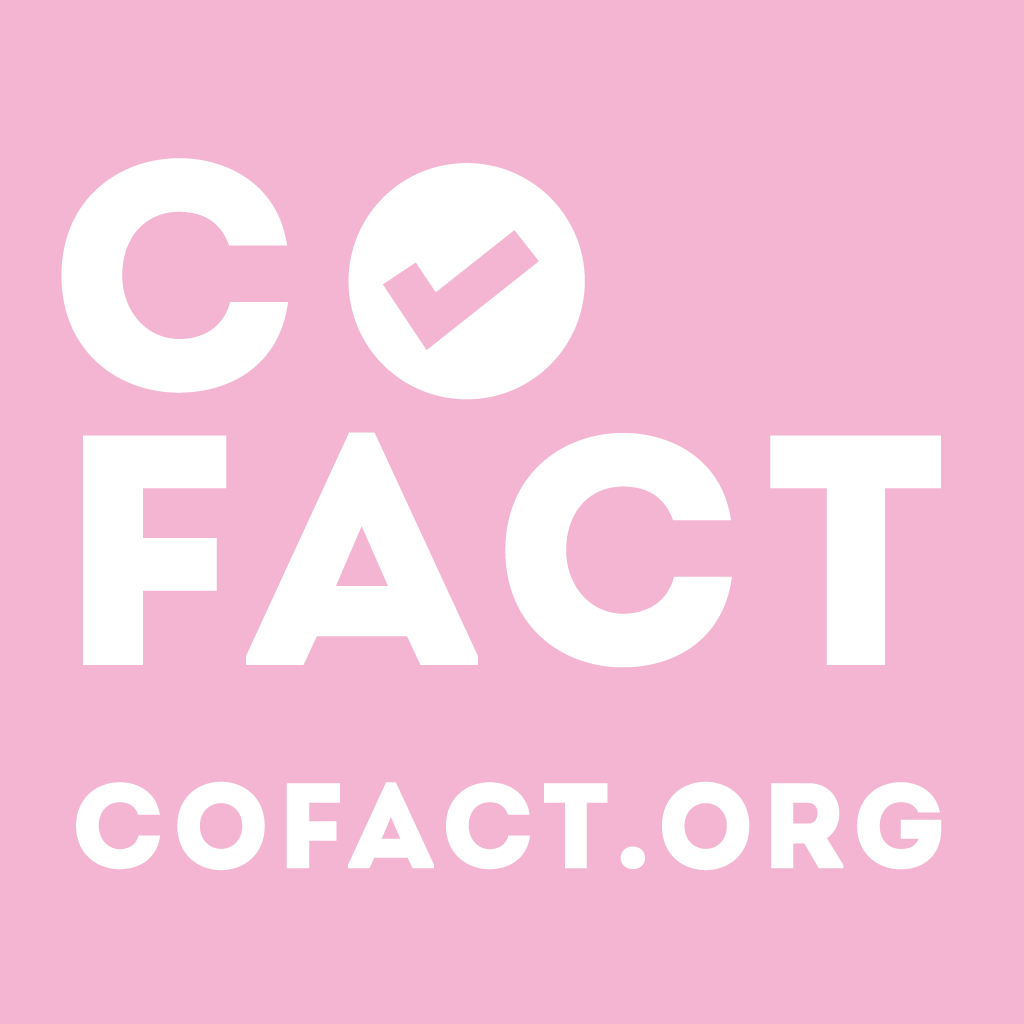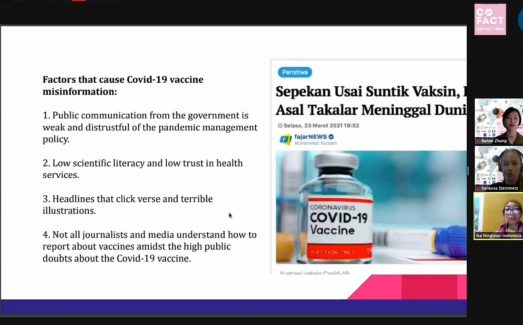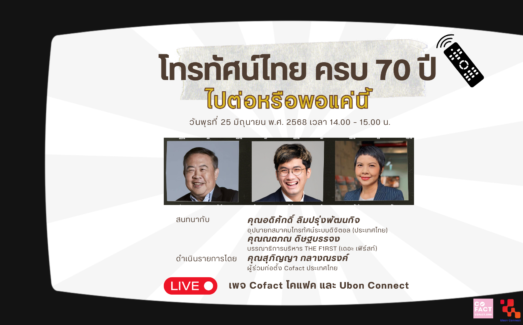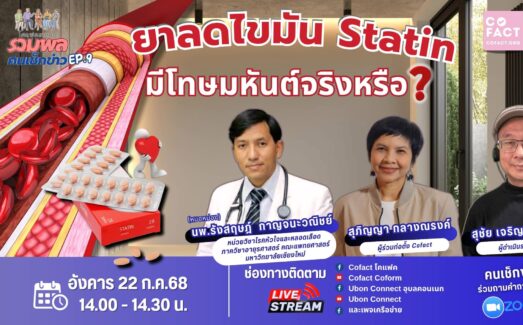A global call for Truth and accountability for journalists killed in Gaza conflicts, panelists say
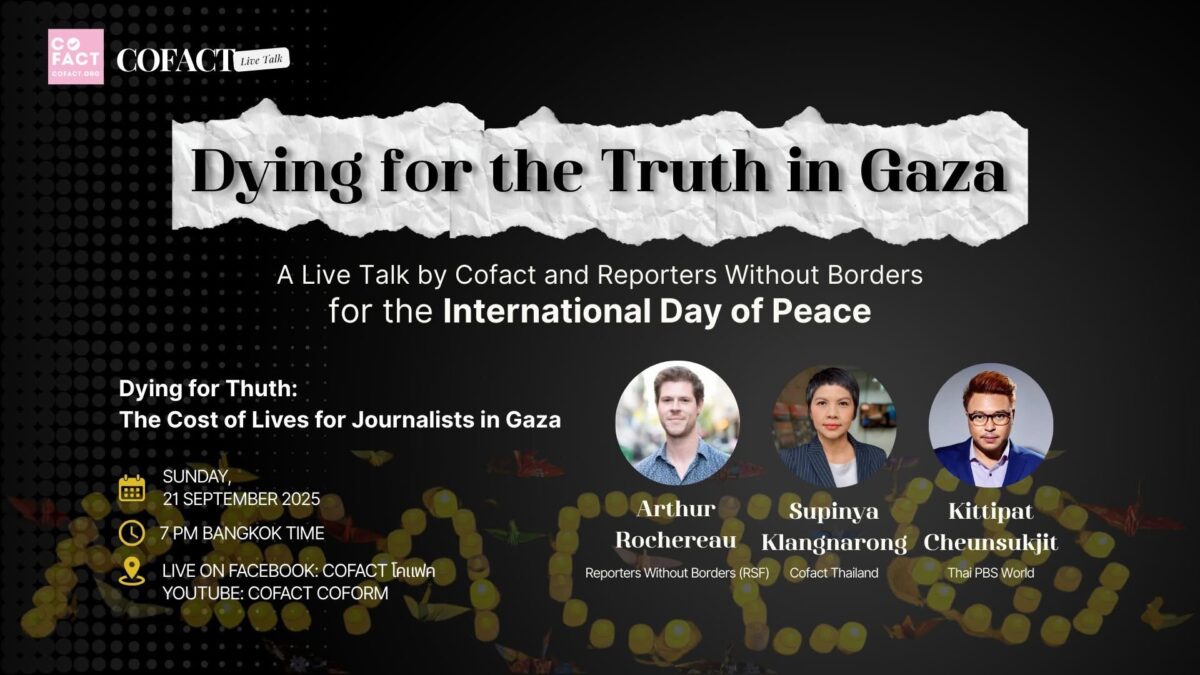
BANGKOK — A panel of media professionals and advocates shed light on the catastrophic conditions facing journalists in Gaza warzones — the deadliest conflict for the press since World War II– and emphasized the importance of truth to mark the International Peace Day on September 21, 2025.
The Cofact Live Talk, hosted by Cofact Thailand and Ubon Connect featuring ThaiPBS World’s journalist Kitipat Chuensukjit and special guest Arthur French, a Hong-Kong-based reporter of Reporters Without Borders (RSF), highlighted the human cost of reporting in a war zone, the dangerous role of disinformation, and the crucial life-saving importance of truth-telling. The core topic, “Dying for Truth in Gaza,” underscored a grim reality: journalists are not just oreporting on the conflict—they are becoming its victims.
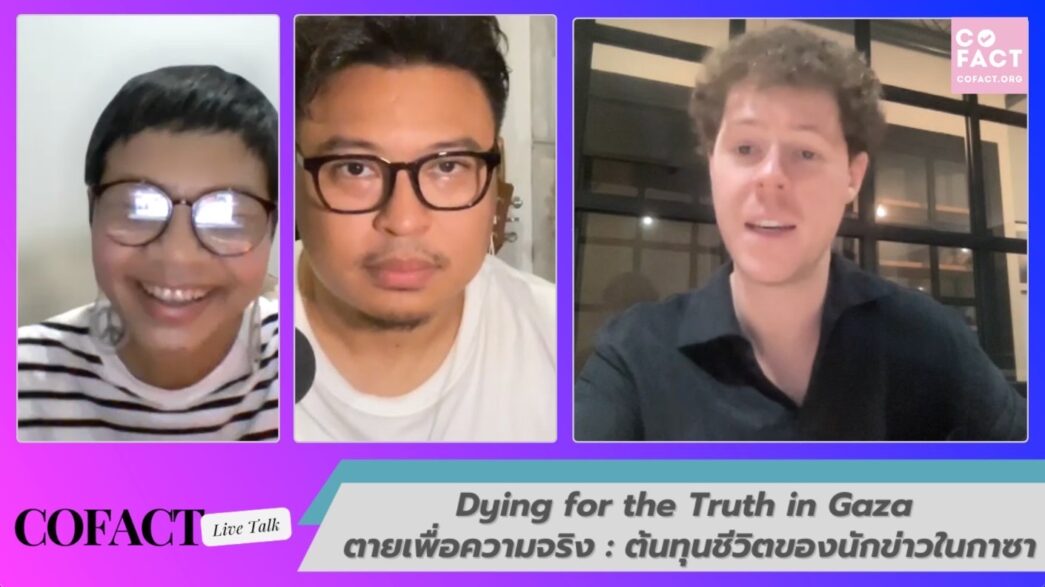
The talks, moderated by Co-founder of Cofact Thailand Supinya Klangnarong opened on a bittersweet note. While celebrating the spirit of peace, the panelists acknowledged the stark reality of ongoing conflicts, particularly in Gaza, where the search for truth has become a fatal endeavor.
Since the conflict began on October 7, 2023, RSF has documented the deaths of at least 220 journalists in Gaza, making it the most perilous place on Earth for media workers. “The situation right now for journalists in Gaza is nothing short of catastrophic,” French stated, detailing how reporters are targeted by airstrikes, sniper fire, and artillery shelling, even when clearly identified by press vests.
RSF has documented at least 56 cases where journalists were deliberately targeted by the Israeli army while on the job. This, he explained, is part of a broader egregious strategy to discredit and neutralize those reporting from the ground. He cited the case of Al-Jazeera correspondent Anas Al-Sharif, who was killed in a targeted attack near a hospital after the Israeli army had baselessly labeled him a terrorist.
French also revealed a crucial, and deeply troubling, aspect of the information war: Israel has banned foreign journalists from entering Gaza since October 2023. This “total media blackout” has left a void, with local Palestinian journalists as the sole eyes and ears on the ground. These journalists are not only facing a constant threat of death, but they also work under unimaginable conditions—displaced, suffering from a severe lack of power and connectivity, and lacking basic necessities like food and water. Over 50 media organizations have been completely or partially destroyed, and dozens of Palestinian journalists are currently in prison, some reportedly subjected to torture.
On the question about the fundamental importance of truth in a conflict zone, Kitipat emphasized that on-the-ground reporting is not a luxury, but an essential tool for accountability and a vital component of humanitarian efforts. French agreed, asserting that journalists are the “eyes and ears of the world.” In a landscape flooded with social media disinformation, their independent reporting serves as a critical check against the propaganda and misinformation that proliferates from all sides during wartime. Without journalists, the true human cost of conflict—civilian suffering, destroyed infrastructure, and violations of international law—would remain invisible.
French detailed an RSF investigation that uncovered a deliberate campaign by the Israeli army to discredit Palestinian journalists. This campaign, which has included photo montages showing journalists’ faces with targets on them and baseless accusations of terrorism, is not just a tool for misinformation; it’s a direct incitement to violence. “Disinformation doesn’t just mislead, it also kills journalists directly,” French stated. This propaganda, he explained, aims to make attacks on reporters easier to justify by painting them as enemies or spies, thereby weakening public sympathy and reducing international pressure.
The panel acknowledged the immense difficulty of seeking justice in such a complex geopolitical landscape, especially when foreign reporters are barred from entry. However, RSF is taking tangible steps. French outlined the organization’s clear demands: protection for Palestinian journalists, independent access for foreign press, and opportunities for trapped journalists to evacuate. RSF is also engaging in large-scale public awareness campaigns, such as a global media action where 280 outlets in 50 countries displayed a black page to symbolize the looming threat of no one being left to report from Gaza.
On a more institutional level, RSF is pursuing legal action. Since October 2023, it has filed four complaints related to killings and injuries with the International Criminal Court (ICC) in The Hague, urging investigations into what it considers war crimes committed by the Israeli army against journalists. The ICC prosecutor’s confirmation that these crimes fall within the court’s mandate, offering a glimmer of hope that those who are responsible might one day be held accountable.
The discussion also touched upon the role of the general public and tech companies. The panelists agreed that social media platforms, mostly US-based, must be held accountable for enabling the spread of dangerous disinformation. French called for a new legal framework that recognizes the platforms’ responsibility for the content they host.
For the public, the message was one of action and solidarity. French emphasized that attacks on journalists are, in effect, attacks on the public’s right to information. Individuals can support press freedom by following and amplifying the work of independent journalists, subscribing to news outlets, and speaking out publicly against attacks on the press. Kitipat underscored a twofold public role: showing solidarity with those risking their lives and taking action to prevent further harm. This includes demanding transparency, insisting on protection, and, most importantly, “refusing the complicity in silence.”
The discussion concluded with a powerful, unified call: “Don’t kill the messenger.” Peace, they asserted, is impossible without truth. Journalists are the ones who document war crimes and expose abuses, making the human cost of conflict visible. Defending journalists and their right to report is not just about protecting them—it’s about defending the collective right to know and laying the foundation for justice and lasting peace.
